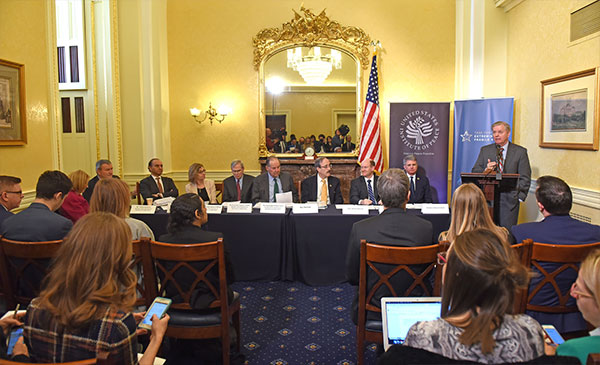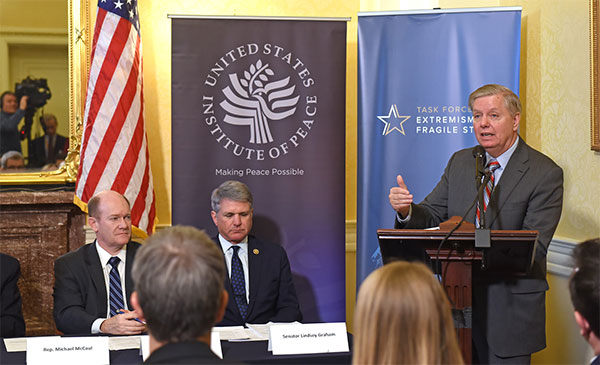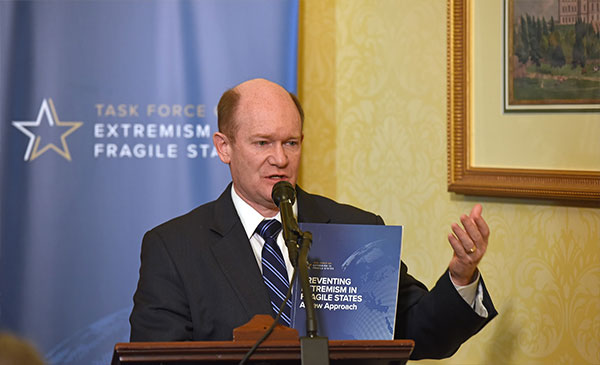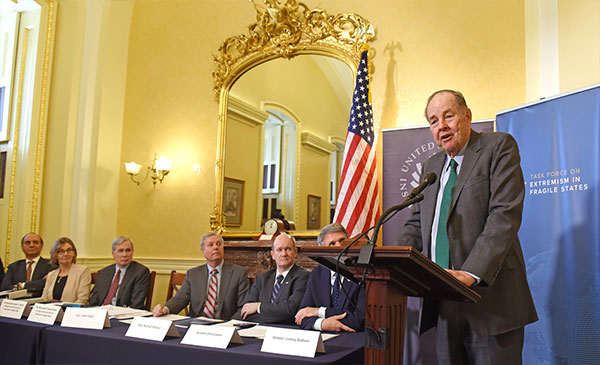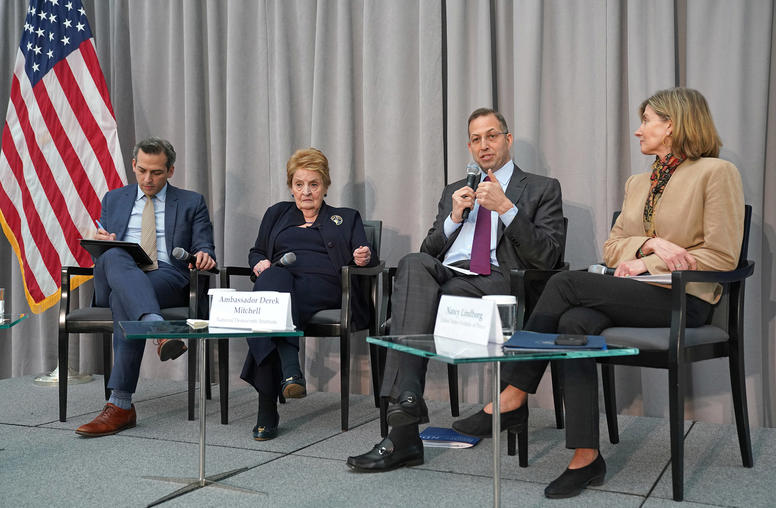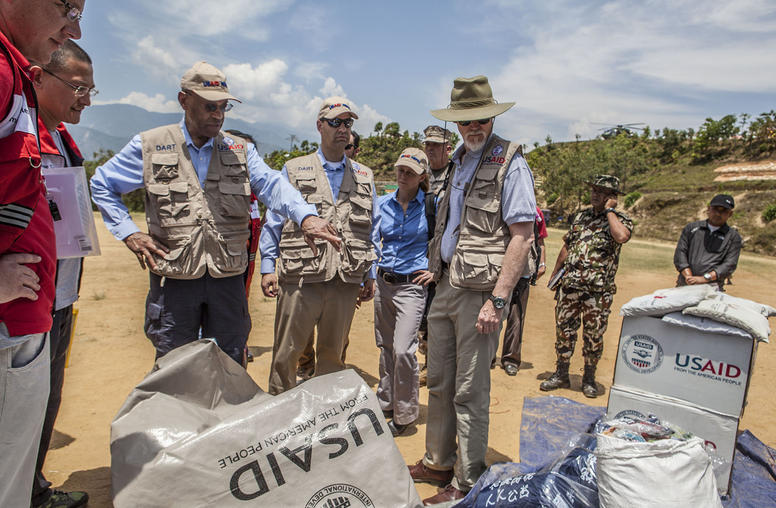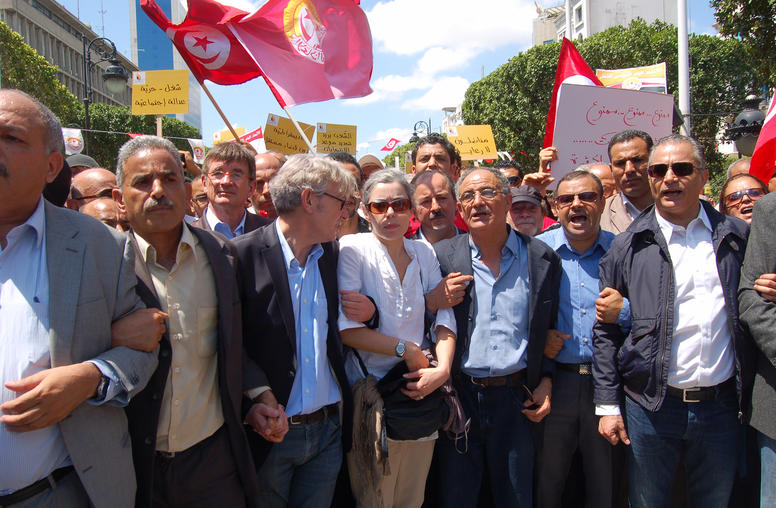Nearly 20 years have elapsed since the terrorist attacks of September 11. While U.S. counterterrorism policy has succeeded during that time in preventing attacks on the homeland, the threat posed by violent extremism has grown and evolved such that quashing it requires an entirely new approach. The willingness of global allies—including partners in the Middle East—to work with the U.S. to stem violent extremism means that, for the first time, a truly comprehensive, multilateral approach is in view.
Task Force on Extremism in Fragile States
Congress charged the United States Institute of Peace, an independent, bipartisan leader in reducing and preventing conflict, with convening the Task Force on Extremism in Fragile States. The bipartisan initiative recommended a new approach for U.S. policy that harnesses existing U.S. programs and international partnerships to target the underlying causes of extremism and limit the ability of extremist groups to exploit fragile states.
The Task Force was led by former New Jersey Governor Thomas Kean and former Representative Lee Hamilton, the co-chairs of the 9/11 Commission. The Task Force included thirteen leading former policymakers, legislators and other experts whose unique experience and insights will shape the Task Force’s policy recommendations.
Final Report

Preventing Extremism in Fragile States: A New Approach
Despite our success protecting America’s homeland, extremism is spreading. Since 9/11, the number of terrorist attacks worldwide per year has increased fivefold. As long as this continues, the United States will remain vulnerable to terrorism while extremism contributes to chaos, conflict, and coercion that drains U.S. resources, weakens our allies, and provides openings for our competitors.
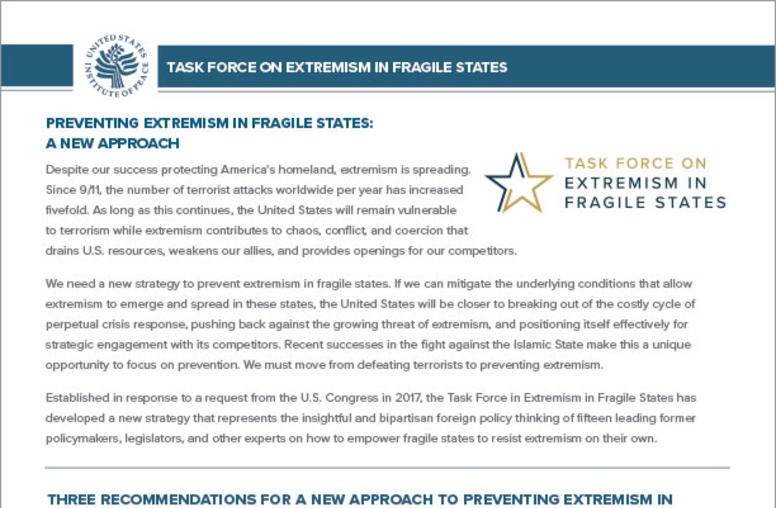
Three recommendations for a new approach to preventing extremism in fragile states
Despite our success protecting America’s homeland, extremism is spreading. Since 9/11, the number of terrorist attacks worldwide per year has increased fivefold. As long as this continues, the United States will remain vulnerable to terrorism while extremism contributes to chaos, conflict, and coercion that drains U.S. resources, weakens our allies, and provides openings for our competitors.
Task Force Events
A New Approach to Preventing Extremism in Fragile States
On April 23rd, members of the Task Force and more experts joined USIP for a discussion the challenge of supporting fragile states to build resiliency, sustain progress and prevent future threats and instability.
Podcasts and a webcast of the full event are available here.
February 26, 2019 Report Release Press Conference
Participants included:
- Ambassador Paula Dobriansky, Senior Fellow for the Future of Diplomacy Project, Harvard University; former Under Secretary of State for Democracy and Global Affairs
- Ambassador Karl Eikenberry, Director of the U.S.-Asia Security Initiative, Stanford University; former U. S. Ambassador to Afghanistan
- Mr. Farooq Kathwari, CEO and President, Ethan Allen Interiors Inc.
- The Honorable Nancy Lindborg, President, United States Institute of Peace
- The Honorable Stephen Hadley, Chair of the Board of Directors, United States Institute of Peace; former U.S. National Security Advisor
- Governor Thomas Kean, co-chair, former Governor of New Jersey, former 9/11 Commission Chair
- Representaitve Eliot Engel (D-NY)
- Senator Chris Coons (D-DE)
- Representative Michael McCaul (R-TX)
- Senator Lindsey Graham (R-SC)
Featured Blogs

We Need a New Approach to Prevent Violent Extremism
Our principal recommendation is both simple and daunting: we need a high-level political commitment to prevention. Our goal should not be to topple governments or install new ones, but to work with local actors to strengthen vulnerable states and societies so that they can better defend themselves.

The Complex Threat of Extremism—And a Pathway to Quashing it for Good
The recent territorial victories against the Islamic State in Iraq and Syria (ISIS) are a significant achievement. However, terrorist groups like ISIS are not traditional enemies, and their strength cannot be assessed on traditional metrics. Thousands of fighters remain, and ISIS is intent on regrouping.

Down But Not Out: Extremists’ Evolving Strategy
The U.S. State Department Bureau of Counterterrorism recently released its annual report on terrorism. The report concludes that despite the success of efforts to dismantle ISIS, “the terrorist landscape grew more complex.” Extremist groups such as ISIS, al-Qaida, and their affiliates are proving resilient and adjusting to heightened counterterrorism pressure with new attempts to destabilize, seize, and govern territory in fragile states.

Seventeen Years After 9/11: Re-examining the Terrorist Threat
Seventeen years ago today, we experienced the gravest attack on our nation since World War II. Everything we thought we knew about protecting the safety of American citizens and security of our shores changed overnight. Americans came face-to-face with an unfamiliar enemy: violent extremists.

Fragile States Fail Their Citizens and Threaten Global Security
Under congressional mandate, USIP has convened the bipartisan Task Force for Extremism in Fragile States to design a comprehensive new strategy for addressing the underlying causes of violent extremism in fragile states. But what is a fragile state? And how does state fragility in the Middle East, Horn of Africa and the Sahel threaten American interests? In this excerpt from the Task Force’s forthcoming report, we dive into the conditions of fragility and how they seed the ground for extremism to take root.

How Extremists Exploit Fragile States
Extremists have attempted to achieve their ideological objectives in different ways. Islamist militants in Algeria and Egypt waged bloody but unsuccessful insurgencies during the 1990s to overthrow those countries' regimes. Osama bin Laden blamed their failure on Western support for secular Middle Eastern states. He created al-Qaida to attack the United States and force it to withdraw from the region.
Interim Report

Beyond the Homeland: Protecting America from Extremism in Fragile States
Today, on the 17th anniversary of the September 11 attacks, the Task Force is releasing its first report, which warns that the United States urgently needs a new approach to stem the spread of violent extremism and previews a comprehensive preventative strategy that focuses on strengthening resilience against extremism in fragile states.

Key Takeaways from the Interim Report
Since the tragic attacks of September 11, 2001, extremist groups have expanded in fragile states across the Middle East, the Horn of Africa and the Sahel. Against this backdrop, the congressionally mandated, bipartisan Task Force on Extremism in Fragile States has released a report that calls for a new strategy to mitigate the conditions that enable extremist groups to take root, spread, and thrive in fragile states.
Podcasts

Nancy Lindborg on Addressing Extremism in Fragile States
Seventeen years after the 9/11 attacks, Nancy Lindborg details the findings of an interim report from the congressionally mandated Task Force on Extremism in Fragile States. Convened by USIP, the Task Force will devise a comprehensive new strategy for addressing the underlying causes of extremism in fragile states, says Lindborg, a member of the Task Force.

Foreign Podicy: Extremism and Fragile States
Today, on the 17th anniversary of the deadliest terrorist attack in America's history, U.S. Institute for Peace has released a new report on "protecting America from extremism in fragile states." To discuss its analysis and recommendations, FDD president and Foreign Podicy host Clifford D. May is joined by Stephen J. Hadley, former national security advisor to President George W. Bush, and now the chair of the U.S. Institute for Peace—a congressionally founded and funded policy institute; Nancy Lindborg, president of USIP; and Reuel Marc Gerecht, a senior fellow at FDD and a former Middle East specialist in the CIA's Directorate of Operations.
